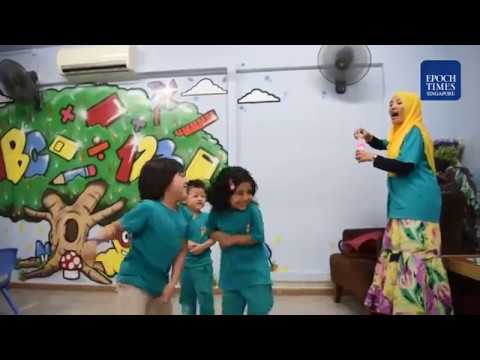By Epoch Newsroom
Reading is extremely important for kids, as it is the foundation and backbone of knowledge. A child’s reading skill is crucial to their academic success in school.– Ms Norashikin Haslir, the founder of PlayDate Singapore
(WATCH: PlayDate: Where books come out to play…)
The class at PlayDate Singapore is a literary playground, where preschoolers participate in storytelling and learn their letters and phonics.
Today, Ms Norashikin Haslir, the founder of PlayDate Singapore, was preparing to read a story to her class of exuberent 2- to 3-year-olds.
“Hush, kids, it’s story time!” The children quickly gathered around Ms Norashikin, and within minutes they were completely absorbed in her animated rendition.
After the lesson, we sat down with the passionate teacher, who is trained in speech and drama, phonics and early childhood.
During the interview, she enthusiasticallyn expounded on the benefits of reading aloud.
“PlayDate teaches children how to love to read. It is not only about the skills in reading, but it is more towards developing their love for reading,” said Ms Norashikin.
“PlayDate is all about love. To nurture kids’ love for reading, I must have teachers who love the kids. Our teachers are passionate and patient individuals who are willing to be clowns to engage the kids,” she added.

Epoch Times (ET): Why is it important to read aloud to kids?
Ms Norashikin: Reading is extremely important for kids, as it is the foundation and backbone of knowledge.
A child’s reading skill is crucial to their academic success in school.
If your child does not know how to read, it will be difficult for him to acquire knowledge. If your child has the right knowledge, he can do a lot of wonderful things.
I advise parents to make it a routine every night to read aloud to their children from a very young age.
We advocate very much in reading aloud stories to kids, as this is the starting point to get your child to read.
When you read aloud, your child will get used to the intonation, rhymes and rhythm. And once they are used to it, teaching them the skills of reading would be very easy.
I started reading to my daughter when she was a baby, and made it a routine to read at least three books to her every night.
When she was around two and a half years old, before reaching [the age of] three, she began reading by herself without me teaching her how to read.
Furthermore, it is a great bonding time for you and your child to curl up together reading a good book.
Once your child associates reading with love, then it will become very natural for them to want to learn how to read.
ET: What should parents take note of when reading aloud to kids?
Ms Norashikin:
1) Create a conducive environment
There should be no distractions (such as TVs or handphones) in the room; just you and your child.
2) Be calm and in the right state of mind
Don’t do it when you are highly stressed, you will feel that it is a chore.
Choose a time when you are relaxed, when you have taken your bath and dinner, that’s when you are a bit calmer.
As children are very perceptive human beings, they will know if you are feeling stressed when you read. If you are not enjoying it, the child will not too.
3) Do it as a routine, and set aside a fixed time
When you create that routine, the child will eventually come to know that it is story time before going to bed.
4) Start with three books
Begin with three books.
Gradually, you might come to a point when you will read 10 books to your child.
As time goes by, another good problem will arise – they don’t want you to stop reading.
5) Read with animation
Read aloud the stories with animation.
You need to know when to pause and when to raise your voice.
Having said that, if you are not a dramatic person, or even if your voice is monotonous when you read, your child will still listen and can sit through the story with you. Because what the child really wants is that quality time spent with their parents.

ET: Besides reading aloud to kids, what else can parents do to cultivate their child’s love for reading?
Ms Norashikin: Create a small library for your child. You need not spend too much on a book cabinet, you can do it with cardboard boxes, and turn it into a small library.
To me, it is extremely important for every household to own a small library, where your child has easy access to books.
Once you have books everywhere in your home, it becomes natural to them that reading is the way to go.
ET: How can we read aloud to infants?
Ms Norashikin: If the babies are wide awake, read to them interactive touch-and-feel books of different textures. Infants like peek-a-boo and flip books.
During the babies’ feeding or nursing time, they will tend to be calmer. This is the moment when you can really bond and connect with the baby. You could consider a different genre of book with a longer story, so as to expose your child to your voice, the different kinds of tones, and vocabulary in a story book.
The more you read to the baby, the more vocabulary they acquire, which enhances their language development.
This is also the best time to expose them to different languages.
ET: How should parents select the right books for their kids?
Ms Norashikin: Parents should be mindful of the content as there are many books that may not be suitable for kids. That is why we have kids that are very clever, but they may not possess the right moral values.
Most of the classic children’s books were evergreen, conveying profound meanings and good values.
I used to own a bookshop because I love books. All the books sold were screened and curated.
Some books may contain bad languages and deliver the wrong values. Even though they are bestsellers, I won’t sell them in my bookshop.
I have the responsibility. I don’t want to sell a book which has the wrong values in it, to land in the hands of a child who is very easily influenced by the values imparted in the books.
Reading is the foundation to everything. Children must be given books which contain the right values. If a child is equipped with the wrong material, you run risk of building a society based on all the wrong values.
Good Titles to Read Aloud
Start reading to your kids and make a positive impact in their lives. Ms Norashikin Haslir recommends a few good titles to read aloud:
For 12-36 Months
1) The Very Hungry Caterpillar by Eric Carle

2) We’re Going on a Bear Hunt by Michael Rosen, illustrated by Helen Oxenbury

3) Brown Bear, Brown Bear, What Do You See? by Bill Martin Jr, illustrated by Eric Carle

4) Planting a Rainbow by Lois Ehlert

For 4-6 Years Old
1) Make Way for Ducklings by Robert McCloskey

2) Library Lion by Michelle Knudsen, illustrated by Kevin Hawkes

3) Giraffes Can’t Dance by Giles Andreae, illustrated by Guy Parker-Rees

4) Swimmy by Leo Lionni
















